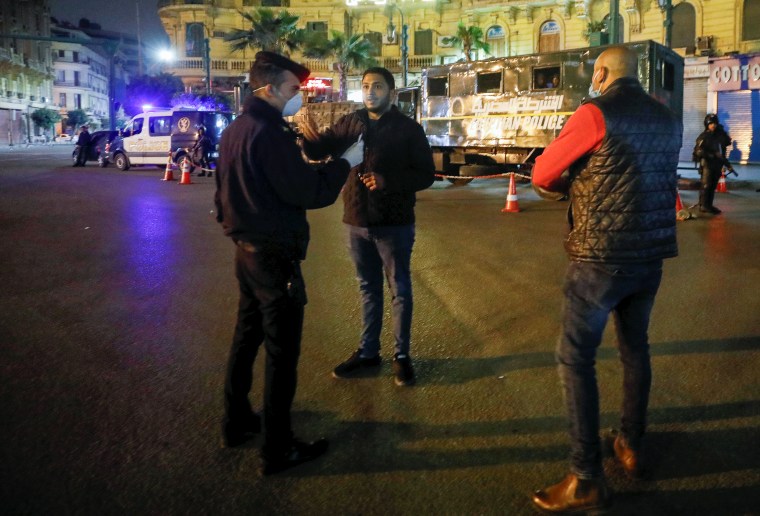As of June 29, 2020, at least four Egyptian journalists who covered the COVID-19 pandemic remain in prison following their arrests in March and April, according to news reports and local journalists and lawyers who spoke to CPJ.
On March 15, state security officers arrested Atef Hassaballah el-Sayed, editor-in-chief of local newspaper al-Qarar al-Dawly, at his home in the city of Aswan, according to el-Sayed’s lawyer Nabih el-Ganadi, who spoke to CPJ in a phone interview, and a report by the Egyptian Front for Human Rights, a Europe-based human rights group.
On April 14, the state prosecutor charged el-Sayed with joining a terrorist organization, spreading false news, and misusing social media, and ordered him to be detained pending an investigation, according to el-Ganadi and that report. He is still detained as of June 29, el-Ganadi said.
El-Sayed’s arrest was sparked by a post he wrote on his now-closed personal Facebook account, questioning the official number of COVID-19 infections in the country, according to el-Ganadi.
On April 13, state security officers arrested Khaled Ghoneim, host of the “Al-Moshaakis” talk show on the privately owned television network Al-Hayah, at his house in Alexandria, according to reports by the Egyptian Front for Human Rights and the Arab Network for Human Rights Information, a regional human rights group.
On April 28, the state prosecutor also charged Ghoneim with joining a terrorist organization, spreading false news, and misusing social media, and ordered him to be detained pending an investigation, according to those reports. He is still detained as of June 29, according to three local journalists who spoke to CPJ on the condition of anonymity, citing fear of reprisal.
The journalists and those reports did not identify the reason for Ghoneim’s arrest and detention. His Facebook posts before his arrest were critical of the lack of government attention given to doctors and nurses treating COVID-19 patients in public and private hospitals.
On April 21, state security forces arrested Ahmed Allaam, reporter for local newspaper al-Karamah, at his house in Giza, according to el-Ganadi, who is also Allaam’s lawyer, and news reports.
On April 27, the state prosecutor charged Allaam with joining a terrorist organization, spreading false news, and misusing social media, and ordered him to be detained pending investigation, according to el-Ganadi and those reports. He is still detained as of June 29, el-Ganadi said.
Authorities questioned Allaam about his video coverage of COVID-19 in Egypt, according to the three local journalists who spoke to CPJ. The journalist is also a freelance documentary producer who has contributed to the local CBC and Safeer TV networks and Lebanese network al-Mayadeen, according to el-Ganadi.
Also on April 21, state security officers in Cairo arrested Mostafa Sakr, publisher of the Daily News Egypt English-language newspaper and al-Borsa Arabic-language paper, and the owner of Business News for Press, the papers’ parent company, according to news reports.
On the same day, the state prosecutor charged him with joining a terrorist organization and ordered him to be detained pending an investigation, according to those reports. He is still detained as of June 29, according to one of the local journalists who spoke to CPJ.
Sakr’s arrest came after al-Borsa published a report on March 16 suggesting that Egypt’s Central Bank manipulated the value of the Egyptian pound against the U.S. dollar in response to the pandemic, according to news reports.
Egyptian authorities previously targeted Business News for Press and Sakr, who was also the editor-in-chief of al-Borsa from 2008 until 2017, according to the local rights group Association for Freedom of Thought and Expression and news reports.
In May 2017, authorities blocked access to Daily News Egypt and al-Borsa’s websites, both of which are still blocked in Egypt today and use mirror websites to publish their content, according to those reports.
The Ministry of Interior, which oversees state prisons and the state prosecutor’s office, did not respond to CPJ’s emailed request for comment.
